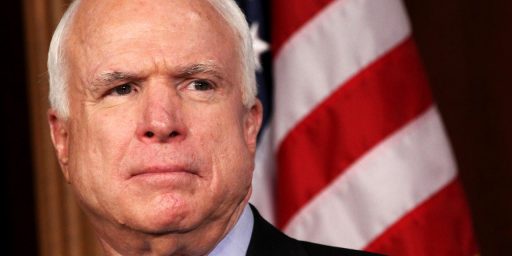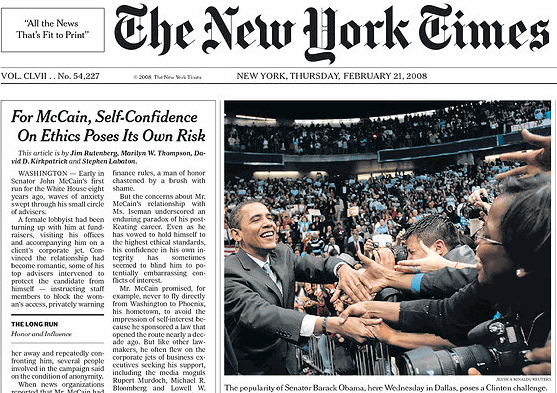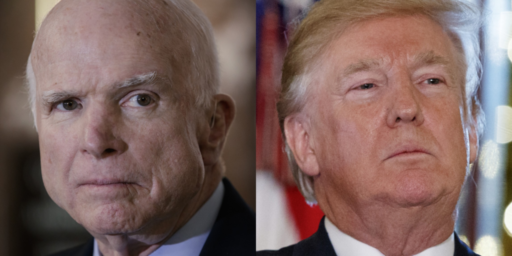Public Financing R.I.P.
In the aftermath of the Watergate scandal, Congress tried to reform our system of financing political campaigns. They attempted to “get the money out of politics.” They failed, miserably. So, too, did a long line of successive attempts.
John McCain, the presumptive nominee of the Republican Party, earned the enmity of a large swath of his party, myself included, by his co-sponsorship and championing of what, after seven years of defeats, eventually passed into law as the Bipartisan Campaign Reform Act of 2002, better known as “McCain-Feingold.” Despite rather obvious restrictions of First Amendment freedoms, the Supreme Court upheld it by a 5-4 margin in McConnell v. Federal Election Commission.
Our long national nightmare may soon be over.
McCain is embroiled in charges that he’s violated his own law, the drumbeat of which has been anew with the attention of Josh Marshall and others, while his main opponent in the Fall, Barack Obama, has opted out of the system entirely.
I addressed the McCain charges back in February and nothing substantive has changed. He’s caught in a legal web of his own spinning and is prevented from getting a ruling from the FEC by the refusal of Democrats in Congress to vote on members, thus creating a lack of quorum. Whether this will change with the recent withdrawal of one of the more controversial commissioner nominees remains to be seen.
The reason this controversy is resurfacing, however, is yesterday’s announcement that Obama would opt out of public financing, preferring to take his chances with his tremendous fundraising machine. Given that Obama had promised to abide by federal limits if his Republican opponent did the same and that McCain has held up his end of the bargain, McCain is naturally trying to make hay of the situation. His opponents, naturally, want to change the story.
Obama’s move, while almost certain to have zero impact on the minds of the voters five months from now, has the editorial boards fuming:
. . . given Mr. Obama’s earlier pledge to “aggressively pursue” an agreement with the Republican nominee to accept public financing, his effort to cloak his broken promise in the smug mantle of selfless dedication to the public good is a little hard to take.
Public Funding on the Ropes [NYT]
The excitement underpinning Senator Barack Obama’s campaign rests considerably on his evocative vows to depart from self-interested politics. Unfortunately, Mr. Obama has come up short of that standard with his decision to reject public spending limitations and opt instead for unlimited private financing in the general election.
Analysis: Obama chose winning over his word [AP]
Barack Obama chose winning over his word.
The Democrat once made a conditional agreement to accept taxpayer money from the public financing system, and accompanying spending limits, if his Republican opponent did, too.
No more.
WaPo Fact Checker Michael Dobbs gives Obama “Three Pinocchios” out of four.
If anyone who isn’t a die-hard supporter of either candidate still cares about either of these controversies on the 4th of July, let alone Election Day, I’ll be very, very surprised.
Regardless, Dave Wissing is right: “we are that much closer to my hope and wish for the complete and total destruction of the idea that the Federal Government should be financing a Presidential campaign in any form whatsoever.” As he notes, in 2000, the Republican bowed out of the system for the primaries and in 2004 both major party candidates did. Now, for the first time, someone has eschewed pubic funding altogether.
Unless radical changes take place, it’s hard to imagine either major party candidate participating in 2008. Indeed, his pledge notwithstanding, Obama would have been a fool to agree to limit himself to $84 million when he can probably raise three, four, or even five times that amount on his own. And, certainly, it’s going to be hard for conservatives to argue that it’s a bad thing that he’s relying on his own money and leaving $42 million in matching funds in the public treasury.
Indeed, when word came out in April that McCain was “moving toward accepting public financing,” I was annoyed.
Frankly, he’d save the taxpayers $42 million if he just quit the race now. Barack Obama’s probably got $84 million laying around the office in checks he hasn’t bothered to deposit. McCain will likely be at a financial disadvantage either way but it would be political suicide to unilaterally disarm.
Sure, this is a bad year to run as a Republican and McCain isn’t the most popular guy at CPAC. But it’s bizarre that he’s hamstringing himself in this way. Whining about how Obama promised to do the same is going to be small consolation when he’s getting swamped in the ad wars.
Now, I wouldn’t quite go this far:
“It’ll be like George Steinbrenner’s Yankees in the ’90s — an All-Star at every position — against the ’90s Kansas City Royals, barely able to meet their payroll,” said Chris Lehane, a Democratic consultant who worked for Al Gore in 2000 and John Kerry in 2004.
But, while $84 million seems like a lot to you and me,
“The reality is that the amount of money that comes from the government is not enough to run a modern presidential campaign,” said Larry Makinson, a consultant to the Center for Responsive Politics, a Washington group that tracks campaign donations.
At some point, there’s information saturation. People will certainly know who John McCain is come November 4th. It’s not like he won’t be able to hire the best pollsters, strategists, and advance teams. But Obama will be able to advertise more frequently in more media markets. If a state is anywhere near competitive, he’ll be able to afford to run spots there to see what happens. McCain will have to pick his battles.
That’s not an insurmountable obstacle. But it’s a handicap he doesn’t need in a race where his opponent is already a heavy favorite.





Obama put himself in that position, and it shows him to be the amateur he is. This is just the latest in a series of revelations that show he cannot be trusted.
Wouldn’t there be a little “hope” and “change” if he actually stated that he was violating his principles for monetary reasons instead of trying to blame Republicans for “forcing” him to do it?
Nothing that is true about Obama, no actions of his past are his fault. His close associates are not the people he knew. While he told the people of Iowa he opposed NAFTA, he sent Goolsby to Canada to tell them it was just pandering (lying) to obtain votes. There has been and is a pattern here for anyone to see.
Well, McCain is actually breaking the law with his current financing practices. Guess that shows him to be the criminal he is and proves he cannot be trusted…
Obama’s change of heart is a wise one. He will take some hits temporarily right now, but by November nobody is really going to care about this issue.
Although i wish he had been honest and said that he was doing it because he believed he could raise more money than he would recieve and he wanted to win, rather than blaming it on John McCain and 527’s. As if there won’t be any 527’s working on Obama’s behalf.
That lie bugs me more, but then he wouldn’t have my vote for his policy positions.
But I don’t really see anything majorly wrong with the change of heart. I think it was foolish for him to make the promise, but it would be more foolish for him to keep it. I think what he gains by opting out far outweighs any damage caused by changing his mind.
That is surely what we desire in a leader. One who stands for nothing. His word is no good. Pledges are empty. What ever benefits great leader is what we will do. Didn’t Hitler promise to cure all of Germany’s ills? I think Lenin had all the answers for Russia. Obama is a liar. Every word, every story contains a lie. How would the liar have Kansas values? He never lived there.
Here is why Obama’s broken promise on campaign funding is a big deal: It emphatically destroys Obama’s claim to be anything but another lying politician.
It’s about the lying and dishonesty. OBAMA LIED, CREDIBILITY DIED.
Obama’s campaign is a tissue of lies built on dishonesty about who he is (he’s a leftist not a centrist), what kind of politician he is (he is a race-baiting Chicago-style kneecapping finger-in-wind pol, not a post-racial messianic wunderkind), and who’s on his side (Soros, the moveon.org leftist nutroots and Hollywood lib millionaires, not everyman contributors).
Obama made a commitment in Nov 2007 to use public financing. He broke that promise. Then in June 2007 when breaking his promise he lied about his opponent, he lied about making efforts that were not made. OBAMA LIED, CREDIBILITY DIED.
The shocker is the OBAMEDIA is in the tank for Obama so much that when the curtain is lifted, they pretend not to notice, knowing they are in on the farce.